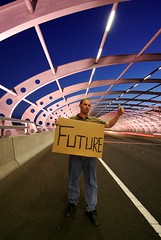 JP Rangaswami doesn't write as often as some blogger, but when he does it's full of great thinking. The Maker Generation in the Enterprise doesn't disappoint. I recommend that you go read it, as I am not going to summarize.
JP Rangaswami doesn't write as often as some blogger, but when he does it's full of great thinking. The Maker Generation in the Enterprise doesn't disappoint. I recommend that you go read it, as I am not going to summarize.
There are some great lines in that aritcle, right? What I wanted to pick up on was his "five principles" of how the workplace will be (is?) different with people who come in expecting things to be different. I'd like to argue that the workplace MUST move to what is described in these principles simply because the nature of work is changing.
- The person will select the “task”, rather than be given the “task”.
- Tasks will be non-linear in nature, rather than assembly-line.
- True team-based work will become the norm, not the exception.
- Cognitive surpluses will be put to use sensibly, rather than discarded.
- Radically different tools and processes will be needed as a result, time-shiftable, place-shiftable, multimedia.
My take on these principles: #1 has shades of Seely Brown and Hagel's book Pull - people will be drawn to the things that are exciting and that will engage them. I'm also reminded of the discussion of creating meaningful "why" understanding of what the work is about, rather than "how" or "what" (Simon Sinek)
Numbers 2 and 3 have me thinking about the way highly productive project teams already work. No one person is able to do it all, and there is advice and input that must be shared all along the path of the project. It makes no sense to force people into boxes that no longer fit! #4 fits here too. If we move away from the assembly line and allow for lumpy, there will be opportunities for people to think about how they work and change their approach for the better.
One of the key barriers to reaching this type of working environment are the beliefs and practices that have been built up over years of "efficient" business practices that encourage managers to make sure everyone is "busy" because that is their only proxy for "productive." We need to change our definition of productive. When I look at JP's principles with this idea in mind, I can see why it is so hard to make the shift. How can it be "efficient" to let people chose the work they do? How can it be okay to let knowledge workers be quiet during the low periods of lumpy work? Collaboration? But how do I reward my star players?
It will also be interesting to read what JP has to say over the coming weeks on this topic, as he promises.
[Photo: "Future or Bust!" by Vermin Inc]